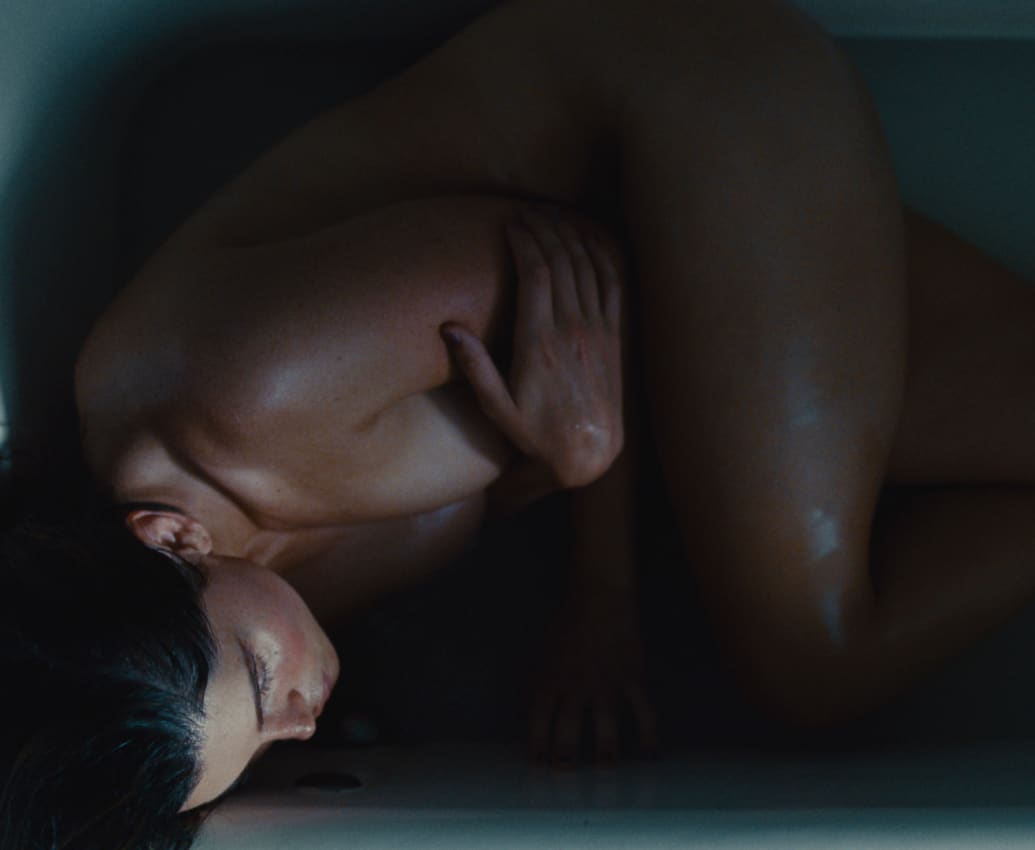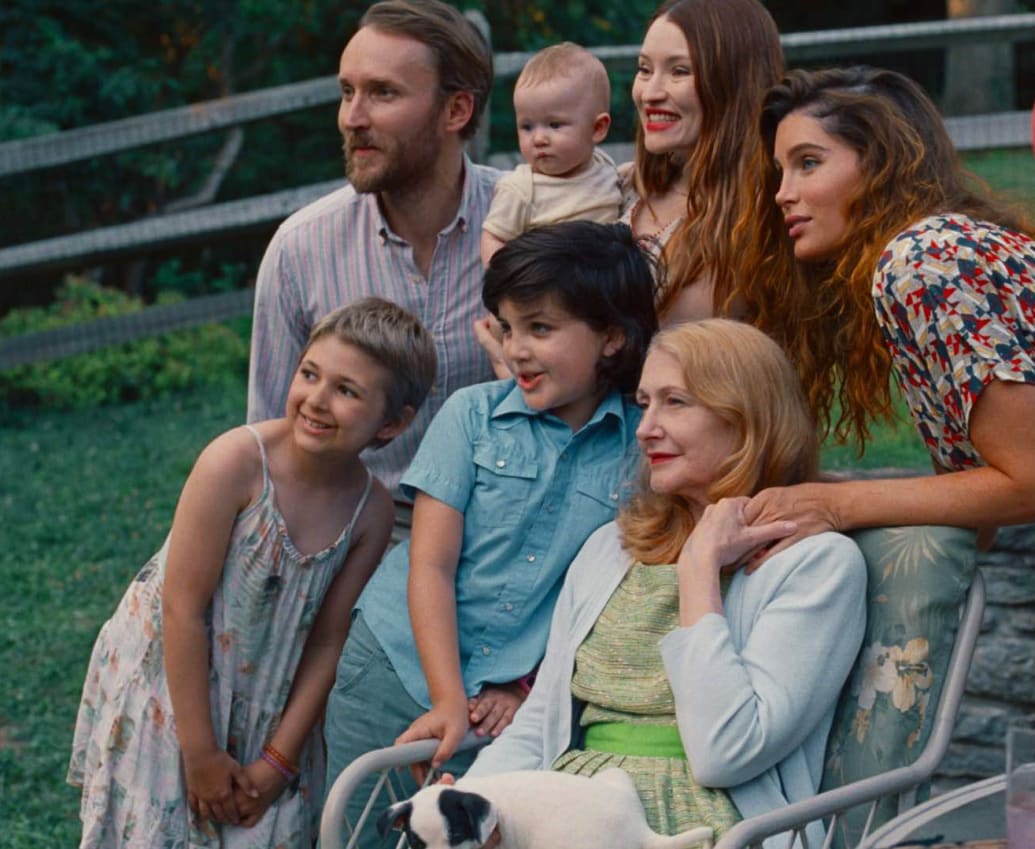When discussing a film like films’ trans characters do. We never see her deadnamed or misgendered in this movie, for example, which is such a relief. Was that something that drew you to the script when you read it?
Actually, it’s interesting you mention deadnaming, because that was a conversation on set. I had come on as an executive producer as well, so there were a lot of those conversations along the way. There actually was a deadnaming in the script at one point, but through a discussion […] we ended up taking it out. And I feel like that was the right thing to do. Drew Gregory, who was the other trans person on set, I was grateful to bounce things off of her. She was the director’s assistant. And Andrea Gallaoro is such a gentle and collaborative person, who just wanted to get it right, and I think that is how we navigated a lot of the trans-specific stuff.
I appreciated how we see Monica’s pain in other quieter ways, like when she’s connecting with her family, and that the film doesn’t force her to be traumatized all over again in doing so.
Absolutely! It’s like, we get to see this fully realized, lived-in trans woman, who has been this way for a long time, just navigating life and doing normal things, like holding a baby, talking to her brother, or playing tag in the forest with her nephew. I think those moments say so much.
Because Monica relies on those intricate, intimate moments, it doesn’t have all that much dialogue. What’s it like to prepare for something like that, which requires you to emote and be present in those moments of silence?
I couldn’t phone anything in—nor did I want to. I love Monica so much. I knew what she represented not only to me but to a lot of the trans women I know. And those still moments, without dialogue, were so emotionally charged: whether I was holding back tears, or crying, or just in deep thought about whatever was going on in the [current] scene or had happened in the previous scene. There were no easy scenes for Monica, because it’s such a contentious and reflective time for her. And [it’s] a finite time for her, given that she doesn’t know how much longer she has with her mom. All of that was swirling around in her head, for the [whole movie]. […] Some of my favorite moments are the ones that don’t have dialogue.
I wanted to talk about the bathtub scene, with you and Patricia Clarkson, who plays Monica’s mother, Eugenia. There’s an intense, beautiful moment, where Monica and Eugenia look at each other and silently exchange something. The film never specifically tells us if Eugenia recognizes her child here, and we get to consider what that means for both characters. What was it like to film that scene?
Well, it was challenging. I remember kneeling on the floor in the bathroom and, uh—[laughs]—my knee, I was having issues with my knee on the hard tile floor! And so—

I have bad knees too, so I can really relate to that!
[Laughs] I was like, can I get a stool or something?! I have to crouch on the hard floor. But no, emotionally, I knew that was going to be a really charged scene for Eugenia and also Monica, but that it was coming with different baggage for Monica than it was for Eugenia. I hope it translates. I feel like it does.When I watch it back, I can see the conversation between their eyes. I knew that Monica’s walls were falling away in that scene, and also how tired she was in that scene, and how much of an epiphany—maybe that’s the wrong word—but there’s a revelation happening for Eugenia. And for Monica, it’s heavy in different ways. I’m glad it didn’t come across as cliché. I really liked how it played out.
I don’t think it comes off as false, either. There’s still so much left unsaid, but that’s where the scene’s power lies. There’s also a fabulous scene in which Monica is getting ready to go out to the bar, and she’s dancing to the viral Romanian hit “Dragostea Din Tei.” It’s such a fun, abrupt throwback, and it somehow felt so right for this character. Was that song written into the script? Was it chosen on the day? Did you already know it? I have to know everything.
[Laughs] It was definitely written into the script. I believe Orlando Tirado chose that one—he’s the co-writer with Andrea. I actually wasn’t familiar with it, so I had it on a Monica playlist on my phone for a couple of months, before we shot. Because I just needed to know the song, obviously.It was a fun scene to shoot, because I got to get in my body and just dance and be free, and I think that’s something a lot of us do before we hit the town! Whether it’s Tina Turner, or “Dragostea Din Tei,” or Lil’ Kim, or Stevie Nicks—good music is good music, and sometimes you’ve gotta throw it on before you let loose.
Since the film’s premiere at last year’s Venice Film Festival, we’ve seen so many very dark, dour things happen, politically and socially, all over the country and in the world. We’ve got lawmakers stripping gender-affirming care from kids and teenagers. There are drag bans and full-on assaults on the rights of trans and queer people nationwide. To have this film debuting right now feels like the hope that many people need, because it’s such a hopeful film. I really wonder what it means to you that this film is hitting theaters right now.
It’s a lot to think about, honestly. I’m trying to make sense of this moment in my career, this hard-fought win in my own personal journey, that’s coinciding with this really, really crazy and dark time for trans people as a whole, as we are trying to navigate all this legislation and hate that’s coming our way. I guess I’m just sitting with the duality of all of that, and I do hope that this film reaches people. And because it is so delicate, maybe it reaches more people than it would have if it was not as delicate, or if it were more preachy or delivered in a different way.
I think that’s a beautiful way to look at it. I hate to make you the head of an entire movement. I just think it’s so important that this movie’s coming at a moment like now.
Yeah. That means the world to me. I just hope it gets the legs that it needs to reach people.

